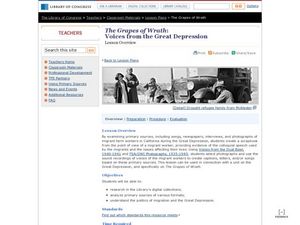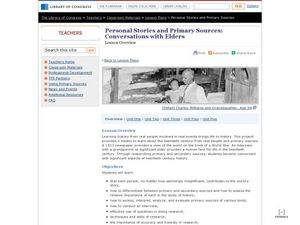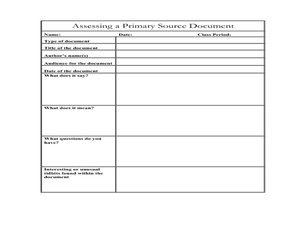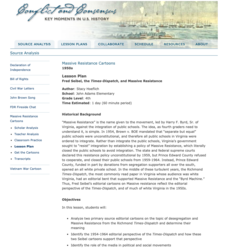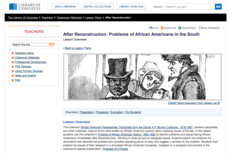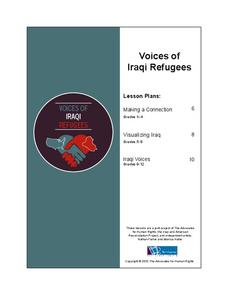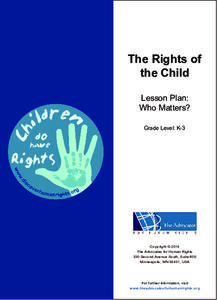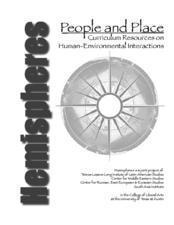Curated OER
The Grapes of Wrath: Voices from the Great Depression
Students research the Great Depression. In this Great Depression lesson, students analyze primary sources to develop an understanding of the plight of migrant farm workers during the Great Depression as they read Steinbeck's The...
Curated OER
Personal Stories and Primary Sources: Conversations with Elders
Students learn from their elders. In this oral and social histories lesson, students analyze primary sources to develop an understanding of the America in which their grandparents grew up. Students conduct interviews with elders in...
Curated OER
Examining the Spanish Flu of 1918
Eighth graders take a closer look at the Spanish influenza breakout of 1918. For this research skills lesson, 8th graders examine primary sources gathered by their instructor and identify how communities prepared (or did not prepare for)...
Curated OER
The People of Kansas: Who Are They and Why Are They Here?
Students examine the settlement patterns of the Kansas Territory. In this Kansas history lesson, students analyze primary documents from the pioneers in the territory. Students write letters or perform skits that feature their findings.
Roy Rosenzweig Center for History and New Media
Fred Seibel, the Times-Dispatch, and Massive Resistance
A lesson plan challenges scholars to analyze editorial cartoons created by Fred Seibel, illustrator for the Times-Dispatch, during the Massive Resistance. A class discussion looking at today's editorial pages and Jim Crow Laws leads the...
DocsTeach
Americans on the Homefront Helped Win World War I
Saving sugar, growing crops, and not eating meat sound like small things, but they were a huge part of the home front effort during World War I. Photographic evidence of civilian struggles during the war, along with a matching game,...
New York City Department of Education
Colonial America and The American Revolution
How did the founding of the American colonies lead to a revolution? Use the essential question and sample activities to guide learners through a series of history lessons. Additionally, the packet includes effective strategies to...
Library of Congress
After Reconstruction: Problems of African Americans in the South
Lynchings, race riots, and Jim Crow laws were just a few examples of antagonism that African Americans faced after Emancipation. Class groups investigate these and other events, and prepare a presentation to inform the class about the...
Advocates for Human Rights
Voices of Iraqi Refugees
The stated goal of this resource is to provide learners with basic facts about and build empathy for Iraqi refugees. To do so elementary classes develop a plan for how to welcome refugees to their classroom. Middle schoolers read...
C-SPAN
Evaluating Historical Presidential Campaign Ads
Political ads flood the airwaves each election cycle. An activity including more than a dozen political ads from iconic presidential campaigns helps learners unpack how the sausage gets made during election "silly season." Using the...
Georgetown University
Tips and Techniques for Taking Notes in Class
From reading the class syllabi or listening for lecture indicators to considering typing vs. handwriting and formatting, read through this list of suggested note-taking tips that can help learners discover which techniques work best for...
College Board
Calculations Aren't Enough!
Unlike mathematics, statistics comes with a context. The author reminds teachers that data analysis involves using the context to make sense of the numbers. The article stresses good communication skills by highlighting the scoring...
Anti-Defamation League
The Gender Wage Gap
"Equal pay for equal work!" may sound logical but it is not the reality. High schoolers begin a study of the gender wage gap with an activity that asks them to position themselves along a line that indicates whether they strongly agree...
PBS
Benjamin Franklin: Writer, Inventor, and Founding Father
Imagine being a writer, inventor, businessman, and the founding father of an entire nation! Pupils analyze the life and activities of Benjamin Franklin. Primary documents, videos, and paintings open up the world of Franklin to young...
PBS
Mark Twain: Storyteller, Novelist, and Humorist
Scholars investigate the use of satire in Mark Twain's writing. Literary lovers research the Adventures of Huckleberry Finn and Tom Sawyer, political cartoons, and videos to see how Twain uses satire to make the stories more memorable....
National History Day
How Did the Food Administration Convince Americans to Make Sacrifices during World War I?
During American's involvemnt in World War I, citizens on the home front became directly involved in the war effort. Scholars uncover just how Americans helped the war an ocean away with primary documents, investigative skills, and...
PBS
Alexander Hamilton: Lawyer, Writer, and Founding Father
Scholars analyze the impact Alexander Hamilton had on the creation of the United States. Primary documents and video clips give learners a glimpse into the life of one of America's Founding Fathers, arming them with enough information to...
PBS
Eleanor Roosevelt: First Lady, Diplomat, and Activist
Scholars analyze the impact Eleanor Roosevelt had on not just the nation, but also on the world. Primary sources and video clips help form a picture of the First Lady and her accomplishments. As a final activity, individuals create...
Advocates for Human Rights
The Rights of the Child
Dr. Seuss wrote " A person's a person, no matter how small." The elementary resource uses Dr. Seuss's book Horton Hears a Who to explore children's rights in an engaging way. Young academics listen to the story, participate in group...
THUP Games
Monkey Math School Sunshine
Hang out at the beach and listen to some relaxing tunes, all while developing basic math skills. An endless source of fun and learning for young children!
K12 Reader
Churchill's Speech: We Shall Fight on the Beaches
Winston Churchill speech delivered to the House of Commons on June 4, 1940, is the focus of a comprehension exercise that asks readers to explain how the repetition in the speech supports the main purpose of Churchill's address.
Curated OER
Geothermal Energy in Latin America
Here is a wonderful series of lessons designed to introduce learners to the variety of renewable, clean energy sources used by people all over the world. Geothermal energy is the resource focused on. This particular sources of energy...
Curated OER
Solar Heating in the Himalayas
A fascinating lesson plan on how solar power is utilized by people who live in the Himalayas is here for you. In it, learners perform a case study which will help them understand that solar energy is a renewable resource, that geography...
Curated OER
Jamestown Scavenger Hunt
Students identify and share Primary Sources in Early American History by Janey Levy. Then they discuss the usefulness of using primary sources in uncovering the past. Students also research original documents from Jamestown to complete...


